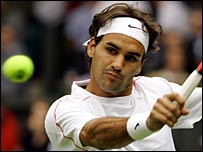
In the interests of variety in my writing avoidance behaviours, I've been watching
Wimbledon. Tennis is one of the greatest of all spectator sports, because it speaks to the Ur-desire of the gladiator-deprived spectator to watch great skill wedded to War, while simultaneously compensating for their sports-wise weaknesses. For many sports (say, cricket or
curling) it is difficult to be captivated unless you have a pretty good idea what the hell is going on -- especially having any kind of clue about which team or player is particularly good or impressive. (Unless, of course, the source of your captivation is the very obscurity of the endeavour, and I confess that this is sometimes very captivating indeed. But let us bracket this particular kind of spectator fetish). In the first place, tennis is damn simple. And in the second, when watching
Federer, you really don't need to understand anything much at all to enjoy the impressive and surpassing brilliance of his game. Wow! Fast! My goodness! Nimble! He hit that ball with his arm all the way out to
here! Criminy! How many mph was that again? Etc.
I love watching the tennis.
Like most nerds, I was not a fan of competitive sports as a kid. I was intimidated by them and withering about those who played them, I waxed lyrical (quietly, to myself) about their arbitrary pointlessness. That's pretty rich, coming from a philosopher, but I didn't know about my future in professional arbitrary pointlessness back then. So maybe, in ye olde comparison with Worthy Persons Making a Real Contribution (eg doctors with
Medecins San Frontieres, cancer
research scientists, primary school teachers, you know the deal), I have something in common with Federer today. But in addition to earning more money (in the sense where "more" is stretched to the point where it ceases to mean anything particularly much) and being much fitter (ditto "much") and, well, being able to play tennis, the difference that strikes me between me and Federer, or frankly any tennis player with even a hint, the merest
sniff of an ambition to play professionally, is their grip on
themselves. They literally can't play until their understanding of their own disappointment, insecurity, motivation, drive, aggression, envy, ability, self-regard, frustration, anything that might tweak the 150mph serve one degree to the left where it ought to be on the right, exceeds the power of those things to ruin their chances of winning. Sportspersons may be the most self-aware people on the planet.
I
suck at this stuff. Dealing with a certain disappointment for me might be the work of a couple of days of mooching around pouting and reading Cadfael mysteries in the bathtub. I can go entire
weeks after talking to a particularly smart person, wondering if my overall smartness is enough to get me to wherever it is that I'm supposed to be going (alert! Side issue). On days when I'm feeling especially good about myself and my philosophical thinking, I have a tendency to go outside and look at flowers or browse bookshops and smile a lot, rather than actually doing any philosophy, which I end up having to do on days of abject self-hatred instead.
Tennis is thoughtfully organised to give you various periods of time to manage your thoughts. You have between points, between games, between sets. And I suppose you have the nano-second or two before you have to get the ball in the centre of your graphite racket head. You can watch the players yank their thoughts into line while matter-of-factly dabbing their sideburns with the commemorative Wimbeldon sweat-towel, just like realigning the strings in their rackets. Two minutes, tops. And then they wander back out there as though they didn't lose the first set to the unseeded player. They're trained to do this! Why aren't I trained to do this? Of course, part of the story is that philosophy is not conducted in nano-second intervals, so you don't have to learn to deal with your shit in world-record time. You can kind of spread it around into all the gaps. You can tell your work to talk to the hand while you (don't) deal. You can do that in this discipline and still do pretty well. In fact, I tend to think that academics are aiding and abetting one another by making
sure that you can spend a lot of time (not) dealing with your shit and still get along OK, because academics are often self-selected in needing a lot of time for shit-wrangling themselves, so they'd better not make it a precondition of success that you can deal with your shit on a world-class timetable.
Another part of the story is that tennis players wouldn't be as good at it as they are if there wasn't a lot of money in professional tennis, enough that it supports an entire industry of people to teach them how to get a hold of themselves in the time in takes the dude on the other side of the net to toss the green felty sphere in the air before they smash it over. I don't do what I do because I want to make a lot of money, but it would be very interesting if philosophy were lucrative enough to make it worthwhile for professional coaches to get philosophers out of their heads. If you know what I mean.
 Last night I watched the season 2 finale (warning! Link contains motherlode of all spoilage) of the best misanthropy of the week, House. We pick up in the scene where the eponymous doc is nitpicking the way of the right and good with the dude who shot his wry patient-hatin' ass before the opening credits rolled.
Last night I watched the season 2 finale (warning! Link contains motherlode of all spoilage) of the best misanthropy of the week, House. We pick up in the scene where the eponymous doc is nitpicking the way of the right and good with the dude who shot his wry patient-hatin' ass before the opening credits rolled.














